Iran Sentences Two More Journalists To Imprisonment
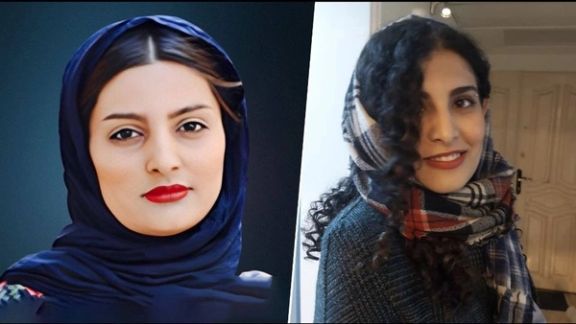
Amid intensified pressure on Iranian journalists, the regime has handed down a suspended three-year prison sentence to two more reporters.

Amid intensified pressure on Iranian journalists, the regime has handed down a suspended three-year prison sentence to two more reporters.
Negin Bagheri and Elanaz Mohammadi were charged with "assembly and collusion" by a revolutionary court in Tehran.
Amir Raeesian, Mohammadi's attorney, confirmed the sentence on Saturday, explaining that the two journalists will serve a fraction of their sentence, and the remainder will be suspended for five years.
According to Raisian, the two were cleared of charges related to collaboration with hostile foreign entities. The court cited a lack of evidence and grounds for the charges, ultimately leading to their acquittal.
The reporters have also been subjected to a five-year "travel ban" and are prohibited from engaging in "professional activities related to the committed crime" or having interactions with individuals active in foreign media outlets.
Elnaz Mohammadi, a reporter for the reformist Ham-Mihan newspaper, is the sister of Elaheh Mohammadi, a journalist who was among the first to report Mahsa Amini's death in custody in September 2022. She was arrested and jailed alongside Niloufar Hamedi. The pair have been detained for 300 days because the regime held them responsible for the nationwide protests that erupted after Amini’s death.
Elnaz was detained in February but was released on bail about a week later. Bagheri, a journalist and women's rights activist, was also released on bail after being summoned, charged, and temporarily detained in February.
Mahsa Amini's death sparked nationwide protests that led to the Women, Life, Freedom movement, the boldest challenge the Islamic Republic has faced since its establishment.
In August, the chairman of the board of directors of the Tehran Journalists' Guild stated that more than one hundred reporters and journalists have been arrested following the protests, emphasizing that the "dark era of journalism" in Iran continues."

More than 300 reform activists and figures in Iran have issued a statement demanding a referendum on the future political shape of the country.
Expressing support for the "Woman, Life, Freedom" movement and those killed and imprisoned by the regime, the activists pointed out, "We repeatedly remind that the structure of religious authoritarianism not only undermines our national foundations but also propels us towards future upheavals and movements towards rebellion."
Two weeks before the anniversary of Iranian protests, the pro-reform individuals representing a more radical posture than former President Mohammad Khatami demanded a referendum to make "structural changes" in the Islamic Republic political system.
Iranians expect renewed protests on the anniversary of the "Woman, Life, Freedom" movement later this month, and the signatories of the statement, without explicitly calling for demonstrations, voiced support for young dissidents. "Now, we express our solidarity once again with all the families affected by the protests of the past year and hold the uprising of young people seeking freedom and equality, especially the resistance of justice-seeking and freedom-loving women, in high regard," they emphasized.
"Therefore, structural change and a referendum to establish a government derived from the people's vote will remain a right that we continue to advocate so that Iran no longer suffers beyond what it already has," they said.
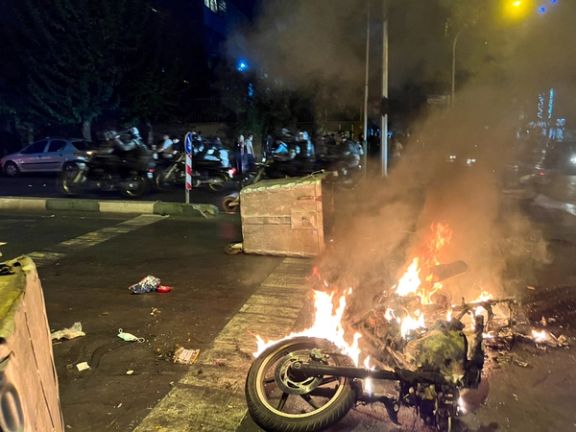
Iran's reformists, who advocate for a more humane version of the Islamic Republic as a form of government, have been driven out of power by hardliners in the past three years. Even moderate conservatives, such as former parliament speaker Ali Larijani, have been pushed into retirement from public office.
When nationwide protests began in September 2022, after the death in custody of Mahsa Amini, reformists were initially ambivalent toward the movement, which appeared to be more radical than simply demanding reforms within the Islamic Republic system. Prominent reformists adopted contradictory postures, with many rejecting regime change as the desirable goal of the protests.
On November 14, two reform figures, former President Mohammad Khatami (1997-2005) and former vice president Massoumeh Ebtekar, broke their silence after more than 8 weeks of protests about the possible demise of the regime and voiced their opposition to dramatic changes in Iran.
Khatami revealed his opposition to regime change by saying that it was "neither possible nor desirable." Nonetheless, he warned that if the current state of affairs continues, the ground is paved for a looming social collapse.
The divergence of opinions among reformists sharpened in February when former prime minister and Green Movement Leader Mir-Hossein Mousavi issued a statement demanding "fundamental change" based on the "Woman, Life, Freedom" movement and constitutional revisions. Mousavi, who has been under house arrest since 2011, said in his statement that the people have given up hope for reforms and they demand widespread change.
Although Mousavi did not openly call for regime change, the demands he put forward could lead to a new and more democratic political system. Ironically, his statement implicitly repeated what exiled Prince Reza Pahlavi has been saying for years, and other opposition figures were demanding during the protests. Mousavi was a pre-imminent Islamic revolutionary in the 1980s.
Khatami, as the symbolic father of the reform movement, nevertheless has maintained his more loyalist position, asking for reforms, while parliamentary elections in March put average reformist figures in a quandary of whether to announce their candidacy or boycott what, in most probability, will turn out to be another engineered vote by the ruling hardliners.
The 300 mostly reformist figures who have signed the latest statement appear to have adopted a position closer to Mousavi, by calling for a referendum.

A decision by Iran’s ministry of labor to revoke licenses for many female makeup and beauty salons and workers has ignited a contentious debate in Iran.
Critics view it as an attempt to limit employment opportunities for women. According to a report by the Shargh newspaper, the Technical and Vocational Organization of the Ministry of Labor has taken the step, which has drawn widespread criticism.
The move is part of regime efforts to crack down on “un-Islamic” social behavior as more Iranian women unveil and appear in public in ordinary attire.
Makeup artists argue that the revocation of their licenses not only hinders new women from entering the field of nail and eyelash extensions and other cosmetic services, but also compels established professionals to operate their businesses in an underground, unregulated manner.
Previously, educational standards for the nail and eyelash extension industry had been accessible through the national portal of the Technical and Vocational Organization, allowing private educational institutions to offer courses, define curricula, charge tuition fees, and conduct training programs accordingly.
However, Shargh newspaper reports that these standards were abruptly removed from the national portal without prior notice. This development leaves graduates who completed their training courses in limbo, as they are no longer able to take the professional competency exams.
Shargh links this situation to a draft law known as the "chastity and hijab" bill, currently being discussed in parliament. It appears that the government is preemptively acting ahead of the bill's passage, with the Ministry of Labor quietly revoking the licenses of some female makeup artists.
On Friday, United Nations rights experts issued a statement calling Iran’s so-called hijab law an outright tool for gender discrimination.
“The draft law could be described as a form of gender apartheid, as authorities appear to be governing through systemic discrimination with the intention of suppressing women and girls into total submission,” the UN experts said. They emphasized that the proposed “Bill to Support the Family by Promoting the Culture of Chastity and Hijab” and existing restrictions are “inherently discriminatory” and may amount to gender persecution.
In a related report, Etemad newspaper suggests that parliament is considering a "ban on nail and eyelash extensions for women" based on provisions in the chastity and hijab bill. The report also notes that parliament members have proposed various suggestions connected to this bill, including prohibiting nail and eyelash extensions for all female students, teachers, and women working in education, both in administrative and instructional roles.
Simin Mohammad Baqeri, the head of the Women's Care and Beauty Schools Association in Tehran, confirmed these restrictions to Shargh. She emphasized that the ban on eyelash and nail extensions alone affects approximately 15 subbranches of the industry.
This sudden government action is expected to lead to a significant number of women either becoming unemployed or resorting to underground employment, thereby relinquishing their legal rights in the job market.
Although there is no precise data on the number of female makeup artists in Iran, a report from 2015 indicated that around 20,000 beauty salons out of 21,000 were operating illegally in Tehran. However, in recent years, more than one-third of these establishments have closed due to stricter regulations, resulting in approximately 747 legal beauty salons remaining in Tehran.
This trend is not confined to Tehran; it is also observed in Mashhad. According to the Women's Care and Beauty Schools Association in Mashhad, prior to 2019, approximately 2,000 beauty salons were operating legally in the city. However, due to the COVID-19 pandemic and associated restrictions, nearly 35% of these businesses have shuttered, leaving approximately 1,300 legal beauty salons in operation.
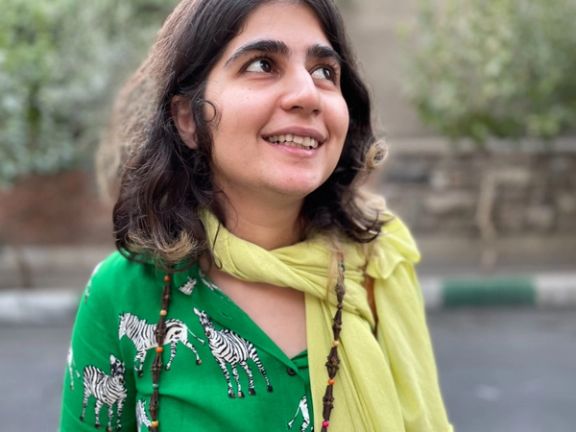
Iranian activist and labor journalist Sepideh Qolian, who was jailed before, has received a 15-month prison sentence due to a complaint by pro-regime reporter.
Qolian (Gholian) gained prominence for her journalistic coverage of prolonged labor strikes at the Haft-Tappeh sugar factory during 2017-2018. Her advocacy on behalf of workers' demands resulted in her arrest and subsequent imprisonment.
In 2019, while detained at Qarchak Prison, Qolian witnessed her own confessions being broadcast on state television. She identified the TV presenter as Ameneh Sadat Zabihpour, known as a mouthpiece for the Iranian regime. She was also a prison interrogator referred to as Ms. Askari during her interrogations. The case was publicized by Qolian which led to Zabihpour filing a lawsuit against her.
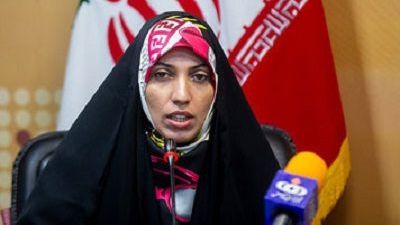
The latest court session pertaining to this case took place on August 22. Notably, this session was conducted in secret due to Qolian's refusal to wear the mandatory hijab.
Mehdi Qolian, Sepideh's brother and a civil activist himself, documented the court proceedings on his Instagram account. He reported that Zabihpour repeatedly objected to Sepideh's presence in court without wearing a headscarf. In response, the court judge issued a "criminal offense" against Sepideh for this reason.
Throughout the court session, Zabihpour, who combines the roles of an interrogator and a reporter, persistently threatened Qolian with charges such as "spying" and "sedition" from the moment she entered the courtroom.
Qolian's commitment to activism remained unwavering even after she completed a four-year prison term and was released in March. Shortly after her release, she was re-arrested for publicly chanting against Supreme Leader Ali Khamenei while not wearing a hijab. This led to an additional two-year prison sentence.
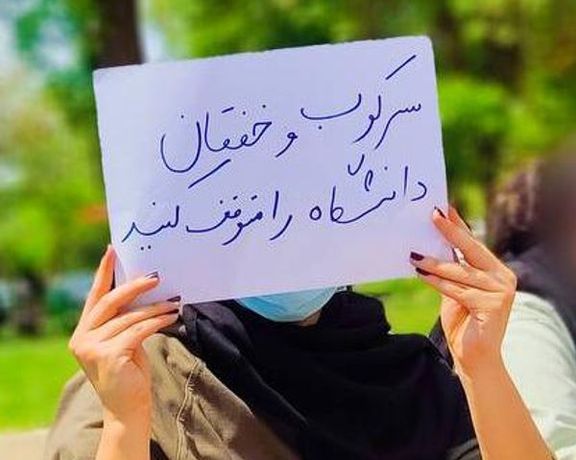
A student-led campaign has garnered over 13,000 signatures in opposition to the expulsion of Professor Ali Sharifi Zarchi from Sharif University in Iran.
The petition, initiated by students and alumni of the university, has gained traction in response to the removal of Zarchi, a faculty member at the institution.
Organizers of the campaign argue that purging who are professors described as "knowledgeable and caring" from the academic community not only undermines the foundations of education but also discourages students, potentially leading them to seek educational opportunities abroad.
Zarchi had previously been summoned by security authorities during the country's period of civil unrest and had recently made reference to a document suggesting that the government, under President Ebrahim Raisi, had initiated the recruitment of 15,000 pro-regime faculty members for dozens of universities.
Furthermore, this incident is part of a wider trend where numerous professors have faced expulsion from Iranian universities due to their critical viewpoints and support for students and the general public in recent weeks and months. Reports of more professors facing similar fates continue to emerge regularly.
One of the latest cases of expulsion involves Somayyeh Sima, a faculty member in the Water Engineering Department at Tarbiat Modarres University.
Student union councils across the country have also reported the expulsion of Hamid Reza Nazarinejad, an associate professor in the Faculty of Law at Gilan University and a former president of the Gilan Bar Association.
In addition, student associations have reported the "prohibition from teaching" of Hassan Bagherinia, a faculty member in the Psychology and Educational Sciences Department at Hakim Sabzevari University, describing it as a "new method of suppression."
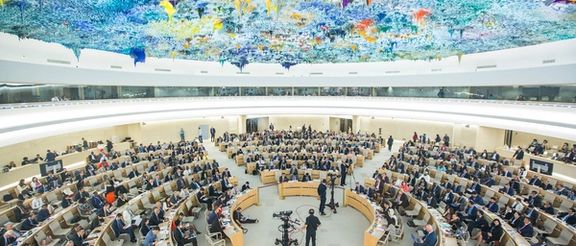
UN rights experts have expressed grave concern over Iran’s new draft hijab bill, with the first anniversary of Woman, Life, Freedom protests only two weeks away.
The legislation, crafted by a dozen hardline lawmakers after the full parliament declined to deliberate on it and assigned the responsibility to a smaller group, encompasses various penalties for women who appear in public without proper attire and complete headscarves.
Following the death of Mahsa Amini in police custody in September 2022, which led to nationwide anti-regime protests, the Iranian government temporarily relaxed its strict enforcement of hijab rules, with more women appearing in public wearing ordinary attire. However, since March, hardliners have intensified their rhetoric and actions to suppress women's defiance of hijab and regain lost ground. They have issued various instructions to government entities in this regard. The current hijab bill represents the culmination of their efforts to reestablish what they describe as "law and order."
“The draft law could be described as a form of gender apartheid, as authorities appear to be governing through systemic discrimination with the intention of suppressing women and girls into total submission,” the UN experts said on Friday. They emphasized that the proposed “Bill to Support the Family by Promoting the Culture of Chastity and Hijab” and existing restrictions are “inherently discriminatory” and may amount to gender persecution.

Iranian rights activists, some media outlets, former government officials and many commentators in Iran have been voicing their opposition to the new hijab law, which has not yet been officially promulgated.
In July, Sara Bagheri, a prominent attorney told local media that the bill violates individuals’ rights, including their right to security and will pose a threat to the reputation and dignity of thousands of women who want to choose their own style of clothing. She also questioned the heavy fines stipulated in the law and asked what would happen if a woman is unable or unwilling to pay.
The UN experts also stated, “The punishments include deprivation of a range of basic freedoms and social and economic rights, which will disproportionately affect economically marginalised women.”
Shima Ghousheh, a law expert, wrote in a commentary published by the reformist Etemad newspaper in July, "The country’s whole budget should be used to build prisons for women because many Iranians will not be able to pay these [heavy] fines and should be sent to prison." She pointed out that the punishments for unveiling or "improper" hijab are much heavier than those prescribed by law for financial crimes, including embezzlement and drug-related offenses.
The UN experts who issued the statement against the hijab law include Javaid Rehman, Special Rapporteur on the situation of human rights in Iran, several other UN special rapporteurs, and members of Working group on discrimination against women and girls.
“The weaponisation of “public morals” to deny women and girls their freedom of expression is deeply disempowering and will entrench and expand gender discrimination and marginalisation, with wider negative consequences for children and society as a whole,” the experts said.
“We urge authorities to reconsider the compulsory hijab legislation in compliance with international human rights law, and to ensure the full enjoyment of human rights for all women and girls in Iran,” the experts told the Islamic Republic of Iran.






